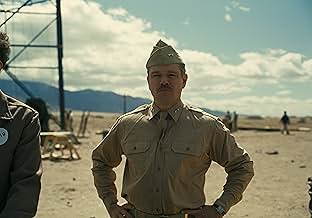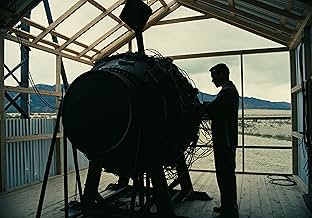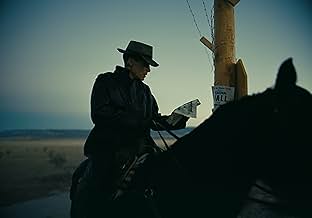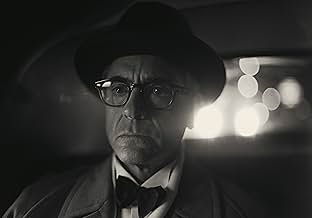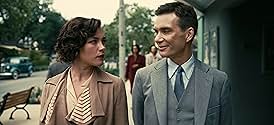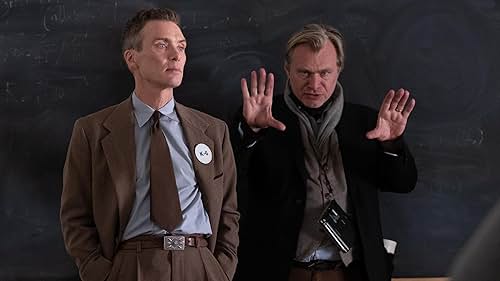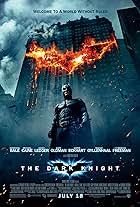A dramatization of the life story of J. Robert Oppenheimer, the physicist who had a large hand in the development of the atomic bombs that brought an end to World War II.A dramatization of the life story of J. Robert Oppenheimer, the physicist who had a large hand in the development of the atomic bombs that brought an end to World War II.A dramatization of the life story of J. Robert Oppenheimer, the physicist who had a large hand in the development of the atomic bombs that brought an end to World War II.
- Director
- Writers
- Stars
- Won 7 Oscars
- 363 wins & 372 nominations total
- Director
- Writers
- All cast & crew
- Production, box office & more at IMDbPro
Summary
Featured reviews
This film is a masterclass in weaving narratives and different time periods while exploring the profound depths of a man whose actions altered the world's trajectory forever, for better or worse. Nolan brings us into the complexities of Oppenheimer, and all the moral conflicts stirring within him.
Murphy's portrayal is so riveting that the long run-time became an afterthought. Robert Downey Jr also offers a great performance and Nolan's push and pull with how he uses sound design throughout is the cherry on top.
Some viewers might need a brief refresher on WWII and Cold War history, but any film lover should be happy to willingly lose themselves in this film for hours on end.
During the height of the Second World War, theoretical physicist J. Robert Oppenheimer (Cillian Murphy) is recruited by the United States government to oversee the "Manhattan Project", a top secret operation intended to develop the world's first nuclear weapons. After becoming acquainted with the project's director Major General Leslie Groves (Matt Damon), Oppenheimer and the General come to an agreement that the best place to carry out such an undertaking is the vast desert of Los Alamos, New Mexico. As numerous other scientists and their families are brought in to this discreet location, Oppenheimer works tirelessly around the clock to build this weapon of mass destruction before the Nazis can devise their own. With the War raging and personal troubles mounting, Oppenheimer continues to push himself to his utmost limits, but soon suffers the consequences of his dedication.
On August 6th, 1945, the atomic bomb "Little Boy" was dropped on the Japanese city of Hiroshima, making it the first time a nuclear weapon was used in an act of war. The dropping of this bomb and "Fat Man" in Nagasaki three days later was what essentially brought an end to World War II, and with it, began a frightening new era known as the "Atomic Age". To this day, it remains a contentious topic of discussion among many as to whether the ethical ramifications of these bombings are justified by what subsequently resulted from it. The one man whom most people pin all the blame on is J. Robert Oppenheimer, whose key role in the development of these weapons led to him being credited as "the father of the atomic bomb", a label which he carried as a heavy burden for the rest of his life. In Christopher Nolan's biopic "Oppenheimer", we are treated to an intricately structured and uniquely tragic analysis of this complex man's legacy and how it still affects everyone several decades later.
In true Christopher Nolan fashion, the story is not told as a conventional biopic but rather as a fragmented, non-sequential series of highlights pertaining to the title subject's life. When we are first introduced to J. Robert Oppenheimer, we see that he is an incredibly intelligent man whose sheer commitment to his craft earns him the utmost respect of many of his peers, even as a young student. However, almost immediately after, the film cuts to him on trial for allegedly having ties to communism, an accusation which threatens to completely derail the positive reputation bestowed upon him. As the judicial committee interrogates him with hard hitting questions, Oppenheimer is haunted by the errors of his own judgement, shown to the audience through flashbacks of varying length to pivotal times in his life. These scenes range from his fractured relationship with his wife to the remorse he has for placing his trust in the wrong people. This gives the viewer a first person perspective of what Oppenheimer's mind must have been processing during this intense period of his life, as he contemplates the very real possibility of having all of his hard work mitigated by these powerful government officials. It's hard to imagine any other director trying to convey so much information to their audience in such a fashion, but Nolan manages to work his magic in the best way possible, always striking the perfect balance of showcasing the triumphant rise and tragic fall of an imperfect man.
Another notable thing about Nolan's direction is his resourcefulness in the way he handles certain important scenes. One moment, which I won't speak about in too much detail, literally had me on the edge of my seat as we watch Oppenheimer and the rest of the scientists test out the prototype bombs with each explosion proving to be bigger than the last. Since Nolan has been vocal about his dislike of using CGI in his movies, he instead opts for more practical methods of showing the increasing power of these bombs. By reminding the audience that the Nazis could very well be working on their own weapon of mass destruction, there is a real sense of urgency flowing throughout these scenes, giving the scientists all the more reason to work even faster to beat the enemy at their own game. As each bomb explodes, it can be likened to a ticking clock, with each blast representing progression towards the end goal of perfecting the ultimate weapon. The creative use of editing during these scenes keeps things moving at a brisk pace, something especially necessary considering the film's three hour runtime. Nolan previously exhibited a similar method in 2017's "Dunkirk", which utilised the film's score in a clever way to show the audience how time is truly of the essence. Once again, Nolan has found a clever way around taking the easy route of using CG effects to tell a story, and keeps viewers on their toes by use of good old fashioned directorial proficiency.
For what can only be described as the performance of his career, Cillian Murphy brings everything necessary to the role of J. Robert Oppenheimer, a man so complex that I can't imagine the amount of pressure there was to play him this effectively. The combined efforts of both Murphy's acting and Nolan's direction help make Oppenheimer one of the most fascinating individuals of the 20th century. This is not a man who can be viewed simply at face value, as there are so many layers to his character that it bears an in-depth exploration that only a movie like this can accomplish. The film paints Oppenheimer as neither a hero nor a villain, but rather a complicated man whose human qualities undermine what he will be remembered for in the history books. Murphy approaches him like that of a Shakespearian figure, rife with flaws, haughtiness, and a sense of hubris that ends up sealing his inevitable fate. One scene may have you admiring his remarkable talents in the field of nuclear physics while another might cause you to hate him for his unfaithfulness to his family. He can be viewed simultaneously as a martyr and a scapegoat for the way in which he helped bring an end to the deadliest global conflict in history, while consequently ushering in something even worse.
The rest of the film's cast all did a fantastic job as well, with the standouts being Matt Damon, Robert Downey Jr, Emily Blunt, and Florence Pugh. Damon's take on Major General Leslie Groves is more than simply that of a stock military character but rather an important figure who seizes the opportunity to use Oppenheimer's talents to his advantage. We watch as Groves forms an unlikely alliance with the physicist, often questioning the ramifications of the theoretical nature in experimenting with nuclear power. Groves's ignorance to Oppenheimer's extensive scientific knowledge allows the audience to learn along with him when it is explained in basic detail. To that effect, he provides an important third party perspective to Oppenheimer's achievements.
It's also great to see Robert Downey Jr shine as Lewis Strauss, which is not only his best post-MCU role but one of his best roles in general. Strauss is a man who is not viewed favourably by history due to his role in exposing Oppenheimer's ties to communism. He holds such a grudge against Oppenheimer that you can practically consider him the true villain of this story. Downey takes every opportunity to show Strauss's two-faced nature, biding his time for the right moment to strip Oppenheimer from the record books and damage his reputation. Reportedly, Downey considers this his best role to date, and it definitely seems like he is putting everything he has into his performance.
Emily Blunt and Florence Pugh also contributed significantly as Kitty Oppenheimer and Jean Tatlock, respectively. Each of these two women represent something significant in Oppenheimer's life, with Kitty being who he should be with and Jean being who he personally wants to be with. This draws parallels to that of Oppenheimer choosing between acting on instinct or acting on intellect when assisting in the construction of the bomb, which again reminds the audience of his flawed human qualities. It can be difficult to give up following your heart but when the fate of the world rests on your pragmatic decision making, sometimes you have no other choice.
As a biopic and a Christopher Nolan film, "Oppenheimer" exceeds virtually all expectations to become one of the very best in both fields. There are few films that are able to tackle such subject matter in this much detail while also remaining entertaining the whole way through. I guess sometimes all it takes is one brave, risk-taking filmmaker to prove that this really is a possible task. We need more films like this to inspire thoughtful, creative discussion and it is comforting to know that someone like Nolan is here to help keep them in the mainstream. After all, it's a tough job, but someone's got to do it for us.
I rate it a perfect 10/10.
Oppenheimer is - with no doubt- going to be one of the best movies in the history. Amazing cinematography, Exceptional acting and terrifying Soundtracks.
All the cast are great from cilian Murphy who is going for the oscar with this role to Rupert Downey jr and Emily blunt and finally rami malik who has small scenes but you will never forget them.
I didn't watch it in Imax as i couldn't wait and ran to the nearest cinema but now i will sure book an imax ticket.
Don't waste any time, book your ticket and Go watch it.. NOW.
Very different than Nolan's recent films, especially the Sci-Fi ones, but shows that Nolan can master the Biopic/Drama genre just as well as he can any other genre he tried to tackle yet. Personally, I must admit that unlike most of Nolan's previous films, I didn't go into this one with overly high expectations. Based on the genre and material the film is based on, I couldn't see how Christopher Nolan could give it his unique touch, and how it could stand alongside films like "The Dark Knight" trilogy, "Inception," and "Interstellar" in his filmography. The film proved me wrong. While it's not my personal top pick in Nolan's filmography, it's undoubtedly his best film so far.
Anyone who has read the book "American Prometheus" on which the film is based, can attest to the incredible editing work Nolan did to turn it from a long and detail-packed narrative into a compact film that captivated such a wide audience. While the direction of the film is no less than masterful and is considered the strongest aspect of the film by critics and award bodies in the US and worldwide, in my opinion, the writing is actually the strongest aspect of the film - whether or not you consider the complex material it's based on.
Legendary Irish actor Cillian Murphy leads the film with one of the best performances seen on the big screen, with his presence dominating the screen time throughout the film's 3 hours, allowing him to leave a long-lasting mark on the history of cinema. Robert Downey Jr. Also gives an impressive performance, capping off a career of over a decade of roles that didn't demand too much acting prowess from him.
The film is 3-hours long yet goes by very quickly and enjoyably. Without spoiling anything, the film presents important and very relevant subjects, and doing so while being non-stop entertainment and a comprehensive character study and a study of our society on a very high pace.
The way Nolan chose to compose the film, and Jennifer Lame's amazing editing (which unusually resembles more of an action film's editing than that of a drama), make the film very dynamic, with its extended length almost unnoticeable. The other technical aspects also strive for perfection - whether it's the costumes, set design, or cinematography.
Ludwig Göransson's work in the musical aspect of the film in particular is masterful, on par with Nolan's previous works. I'm actually visiting the score on a daily basis. The cinematography is stunning and the editing is cutting edge. As I mentioned, this movie is a masterpiece in pretty much all technical fronts as well.
When watching the film, you can't help but feel it's a collaborative effort of a highly talented ensemble - from the actors to every single person responsible for every small detail in the film's production, all under the guidance of an experienced artist who has honed his craft over a career of more than 20 years. It feels like all of Nolan's previous films and the various genres he attempted to tackle improved his filmmaking abilities in different and diverse aspects, so that ultimately everything converged into this film, in which every aspect strives for absolute perfection, delivering everything we've come to expect from a Christopher Nolan film.
Without mentioning anything specific, there was one scene that caused almost every single person in the theatre to move nervously in the seats, non-stop for a long period of time, being one of the most intense scenes I ever watched in a movie and reminding me of the true power of the cinematic experience like no other movie did in recent years.
After a career filled with masterpieces and amazing films, Christopher Nolan finally managed to craft a perfect film - and to my great delight, he finally received the recognition he deserves. Despite all odds, the film managed to captivate audiences in disproportionate amounts for its genre, proving to studios and audience opinion alike that true cinema will always prevail. The year is only half-way through but right now this is my top pick for the upcoming awards season. Picture, Writing, Directing, Acting, Score-- Oppenheimer is a winner on all fronts. A rare feat for filmmaking and a salient reminder that cinema is not dead.
I highly recommend this film to everyone. Watched it once already, and going back to the theatre for at least a few more times soon.
Nolan once again shows he is an expertly craftsman in filmmaking! This stands as perhaps one of his more humble movies but also one of his greatest! Reminds me of his earlier movies!
The cast is also AMAZING with Cillian Murphy delivering the performance of his carrer as Oppenheimer, esentially becoming him, and pretty much securing himself an Oscar nomination for best lead actor! Robert Downey Junior also gives one of his best performances, reminding us all that despite 10 years as Iron man, he can still act!
The soundtrack, sound and editing is also masterfull and further creates a cinematic experience like no other!
Overall an esential viewing experience about historic events that still remains very relevant to this day! One of my favorite Nolan movies!
Engineering 'Oppenheimer'
Engineering 'Oppenheimer'
Did you know
- TriviaIn order for the black and white sections of the movie to be shot in the same quality as the rest of the film, Kodak produced a limited supply of its Double-X black and white film stock in 70mm. This film stock was chosen specifically for its heritage - it was originally sold to photographers as Super-XX during World War II and was very popular with photojournalists of the era.
- GoofsThe stop signs are yellow in the film, which is accurate. The United States used yellow stop signs until 1954.
- Quotes
J. Robert Oppenheimer: Albert? When I came to you with those calculations, we thought we might start a chain reaction that would destroy the entire world...
Albert Einstein: I remember it well. What of it?
J. Robert Oppenheimer: I believe we did.
- Alternate versionsTo get a U/A rating certification in India, the movie was edited to remove or censor all nudity using CGI. For example, the scene where Tatlock and Oppenheimer have a conversation and the former character was topless, the nudity was censored with a CGI black dress. Many Middle Eastern countries use this exact same censored version for release.
- ConnectionsFeatured in Louder with Crowder: Going Out with a Bang! (2022)
- SoundtracksHoliday in Big Band Land
(uncredited)
Written by Gerhard Narholz
Performed by Les Brown and His Band of Renown
Details
- Release date
- Countries of origin
- Official sites
- Languages
- Also known as
- Oppengeymer
- Filming locations
- Los Alamos, New Mexico, USA(only interiors, Los Alamos facilities interiors, including Oppenheimer's house, Fuller Lodge Interior and Exterior)
- Production companies
- See more company credits at IMDbPro
Box office
- Budget
- $100,000,000 (estimated)
- Gross US & Canada
- $330,078,895
- Opening weekend US & Canada
- $82,455,420
- Jul 23, 2023
- Gross worldwide
- $975,811,333
- Runtime3 hours
- Color
- Sound mix







